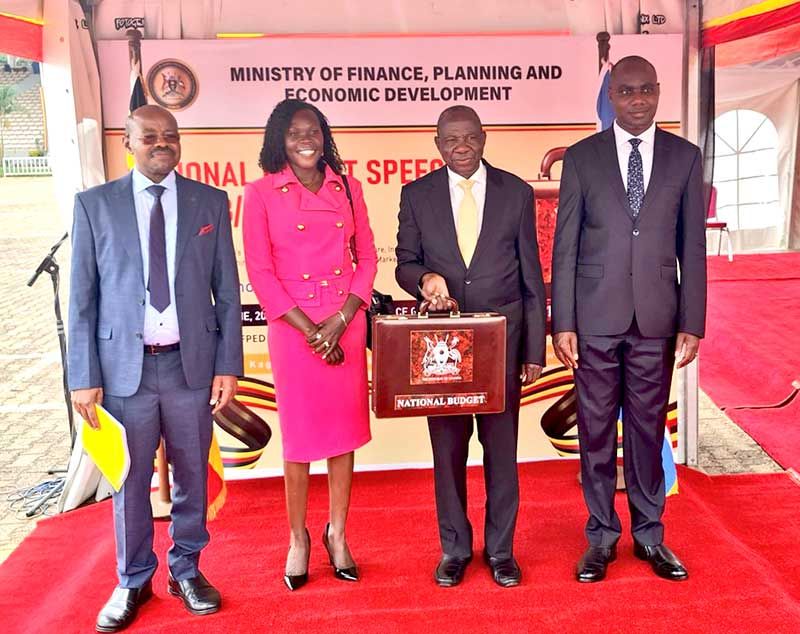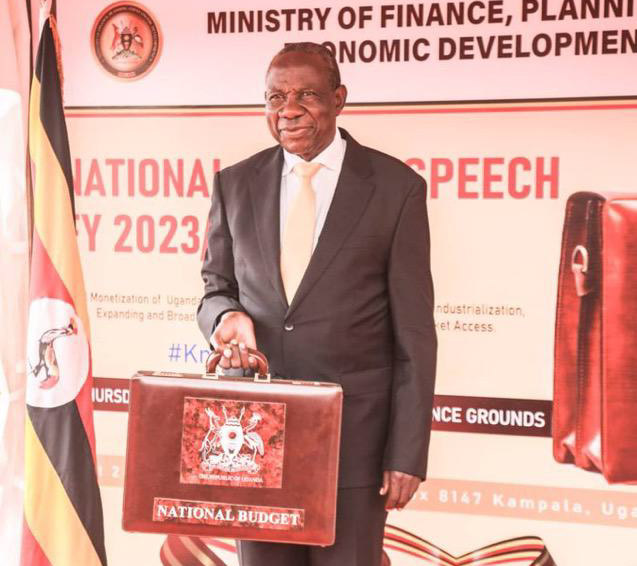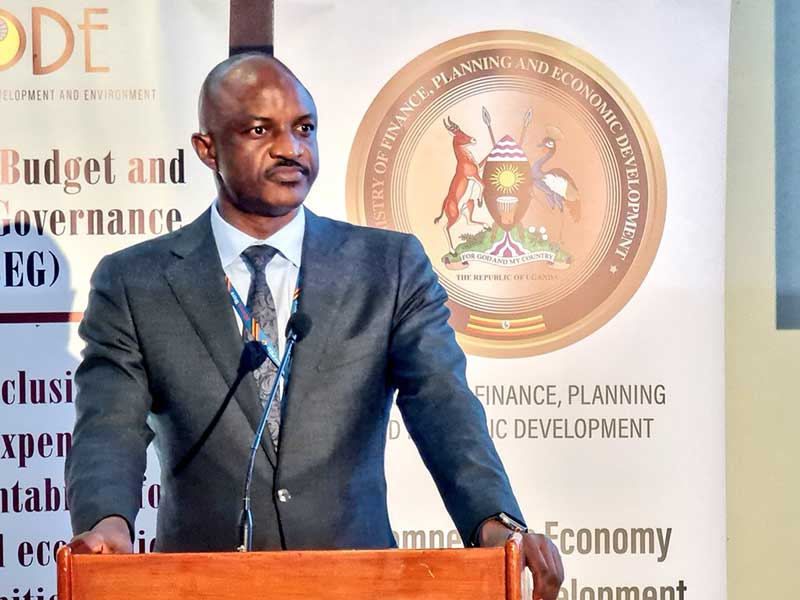

Finance Minister Matia Kasaija
The Minister of Finance Planning and Economic Development Matia Kasaija successfully completed one of his noble tasks last Thursday June 15 – presenting to the country the National Budget for the coming fiscal year 2023/24.
The approved budget worth UGX 52.9 trillion is an important document and a handy guide that outlines broad government spending priorities over the next 12 months of the fiscal year – July 2023 to June 2024.
But even with an untrained eye for money, one can see that the newly presented budget is a galore of opportunities for everyone in this country.
To start with, the government has kept its promise of injecting at least one trillion shillings annually in the Parish Development Model. During the next financial year, an additional UGX 1.1trillion has been allocated for the Parish Development Model (PDM), one of the NRM government’s flagship economic interventions targeting poor individual Ugandans considered to be out of the money economy.
It’s a formidable boost to the government’s pledge to ensure that the vast majority of the rural poor get into the money economy by giving them affordable access to funds.
Minister Kasaija reported that in the outgoing financial year 2022/23, UGX590 billion had been disbursed by the time of reading the budget and that the remainder of the UGX1.1 trillion allocated in the 2022/23 budget was anticipated to reach applicants by the end of June 2023.
If one doesn’t get touched by PDM, there are several other windows of opportunity as were highlighted by Minister Kasaija.
Besides PDM, there’s the Presidential Initiative on Wealth and Jobs creation (Emyooga). Operating both at Sub county level under SACCOs and at Parish level through Parish-based associations, the initiative has extended up to UGX 249bn to constituency-level SACCOs, while an additional 600,000 individuals have tapped from Emyooga pool of resources.
During the next financial year, the government has promised to provide an additional UGX100 billion to be used as seed capital to help boost small businesses operated jointly through SACCOs and individually.
For the unskilled section of Uganda’s population, the government has further set aside an additional UGX60 billion for skilling the youth under the Presidential Industrial Hubs Initiative.
No stone has been left unturned, it seems, if one considers also that the government has boosted the lending power of Uganda Development Bank by an additional UGX85bn for the next financial year.
The development bank, with a total loan portfolio of UGX1,298 billion as at
December 31, 2022 has proved to be a powerful war chest for the government in its campaign against high-lending rates offered by commercial banks.
According to Patricia Ojangole, the UDB Managing Director, the government has kept its commitment to expand the capital base of the bank as seen by the successive additional investments every year over the past five years.
In the formal sector, more resources have been directed towards small and medium enterprises. For example, through the World Bank-supported Investments for Industrial Transformation and Employment (INVITE).
Minister Kasaija informed the Country that the government has allocated UGX209bn to be made available for longer-term lending to SMEs manufacturers and exporters.
With increased support to agricultural research institutions, as well as more funding for climate change adaptation measures, small and medium scale farmers at the grassroots will also have the opportunity to access improved seeds and solar-powered water for irrigation projects to cushion them against the vagaries of unpredictable weather.
In the new budget, the government has allocated UGX2.2 trillion targeting food security, irrigation, climate change mitigation, value chain development, agricultural research & disease control.
The Permanent Secretary and Secretary for Treasury (PSST) in the Ministry of Finance Planning and Economic Development Ramathan Ggoobi has appealed to Ugandans to take advantage of the numerous opportunities in the budget to lift themselves out of poverty.

PSST Ramathan Ggoobi
During a post-budget dialogue held in Kampala recently, Ggoobi said the government is redirecting resources towards wealth creation by facilitating more Ugandans to join the money economy and to do business to accelerate the rapid expansion of the economy & industrialization.
“The goal is to make the economy work for everyone – a farmer; a trader; a street vendor; a worker; a journalist; an industrialist; a banker; a borrower; a professional service provider; a civil servant; a medical personnel; a security personnel; a young guy earning from gigs; every woman and man; the elderly; a politician; and you and I,” said PSST Ggoobi at the 2023/24 Post Budget Dialogue in Kampala which was organised by Absa bank & NTV Uganda.
Apart from the numerous opportunities for accessing interest-free or highly subsidized loans made available by the government to different segments of the population, the government has taken further frugal steps to reduce leakages of tax payer’s money.
One of those measures, as Minister Kasaija announced, is the ban on purchase of new vehicles for government workers and political leaders in the next financial year. The only exception, he said, will be purchases of hospital ambulances, medicine delivery trucks and vehicles for agricultural extension staff.
In another win-win situation for the private sector, the government promised to reduce borrowing from the domestic market to about UGX3.2 trillion or 2.2 percent of GDP.
By reducing the pile-up of domestic debts, the government is challenging banks to lend more to the private sector and stop relying on government treasury bills and bonds.
But crucially, as well, reduced government borrowing helps to reduce resources that go towards debt repayment, which in turn helps to free-up resources needed for economic and social development projects that benefit more people.
That being noted, however, it is important to remember that the government has not forgotten to make critical investments in the social sector such as education, health and water as well as in the production sector where transport and electricity infrastructure have received prime consideration. The planned commencement of the construction of the Kampala-Malaba standard gauge railway (SGR) has been allocated UGX535bn in the new budget. As a matter of fact, a total of UGX4.5 trillion – equivalent to 13.3 percent of the total budget, has been allocated to roads and transport infrastructure improvement.
This also includes at least UGX1 billion that has been budgeted for maintenance of murram roads maintenance in each district, city and municipality.
For the Greater Kampala Metropolitan Area, some US$608 (Approximately UGX 2.25 trillion) has been budgeted to improve roads and drainage systems in the most economically productive region.
All said and done, the new budget covers everyone and every business in the country.
Minister Kasaija stressed this when he said that: “It is a budget that provides an opportunity for every Ugandan to have a stake in the economy. This budget supports the transformation from a raw-materials based economy to a manufacturing and Knowledge-based economy. It therefore promotes value addition, business growth and job creation for youth, women and all Ugandans.
Members of the Private Sector Foundation Uganda (PSFU) nodded in approval to the budget when they observed during a post-budget engagement that at least 70 percent of their recommendations had been integrated into the 2023/2024 budget.














Henry Lutaaya
Leave a Comment
Your email address will not be published.